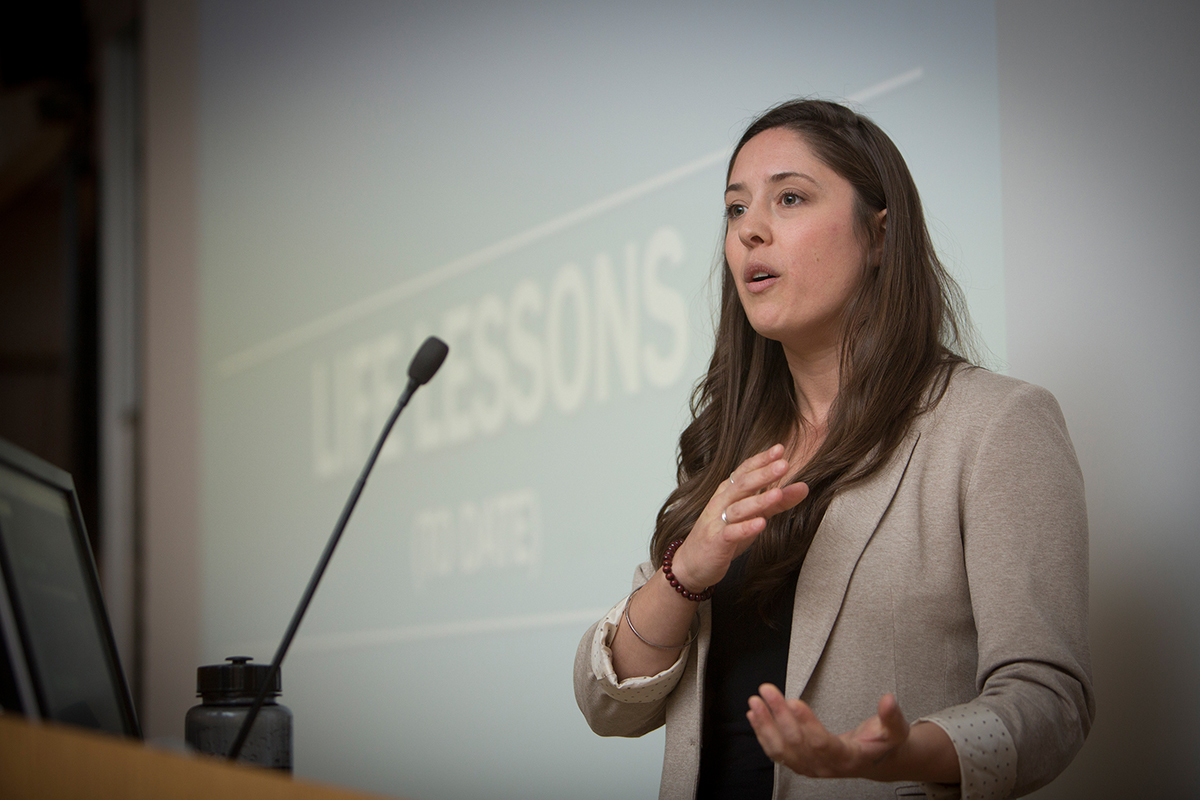Design alumna shares lessons on sustainability, life
By H. Roger Segelken

At the biennial Glenn H. Beyer Memorial Lecture April 27 on campus, Design and Environmental Analysis (DEA) alumna Jessica Cooper ’07 meant to focus on “emerging innovations and evidence-based research about how we can design buildings specifically to support the health and wellness of the people who live, work and learn in them.”
The executive vice president and director of sustainability at Delos Solutions was eager to explain her firm’s development of the WELL Building Standard, apropos of the lecture’s focus on sustainable design in honor of Beyer, the late director of the former Cornell Center for Housing and Environmental Studies.
Then Cooper looked over her audience and had a better idea. She had just watched Jack Elliott, DEA associate professor, confer student excellence awards on top seniors, who clearly had careers on their minds.
Cooper, nine years out of Cornell and rising rapidly in her field of sustainable interior design, seized the chance to tell some lessons-learned stories to the College of Human Ecology audience.
Don’t be afraid to start at a small company (her first had around 15 employees) because it’s a chance to learn all aspects of the business and work directly with a variety of clients, Cooper said.
“I also learned that sustainability wasn’t as highly valued [in some clients’ priorities] as it was to me,” she said. Sustainability as an inherent good was a hard sell in 2008, as the economy tumbled and construction budgets evaporated. Everyone at Cooper’s first firm took pay cuts and worked longer hours – for years.
Pitching sustainability in the building trades during a national recession made Cooper realize something else: “Architects are risk-adverse. They have a lot of liability on the line as they execute projects, and if they recommend a product or solution that doesn’t end up working on site, they could put their entire firm and practice at risk.”
Still, she persevered. As the economy improved, more decision-makers in the real estate industry began to appreciate the once-radical notion that healthful indoor environments could be good for business.
Take time, Cooper advised, to volunteer in extramural causes. That’s how she got her next job, with the Urban Green Council. And now at Delos, Cooper told the students, she holds a key post with a company that values human health and sustainability.
Finally, don’t get down, Cooper said, revealing a statistic: Americans spend 90 percent of their lives indoors. “My initial response to that was, ‘This is depressing,’ that we should get outside more,” said Cooper, who grew up in Ithaca. “But that’s what’s great about it: It really puts us in an empowered position. We engineers and architects, interior designers and building operators are positioned to have a huge impact on the way people feel on a day-to-day basis.”
In that way, the returning alumna gave her thumbs-up to the structure where the lecture was held. Exercise is important to occupants – and to building sustainability advocates – and elevators are anathema. Pointing to the well-trod staircase outside 120 Physical Sciences, a LEED Gold building that didn’t exist when Cooper was a student here, she said: “I like this place; I can’t even find the elevators!”
H. Roger Segelken is a freelance writer.
Media Contact
Get Cornell news delivered right to your inbox.
Subscribe